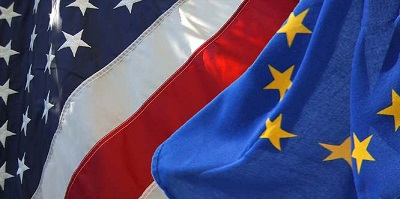By Jaime Malet | During the meetings that took place at the World Economic Forum summit, headed by the economic leaders of various countries, the main conclusion I reached was that the recipes expounded to attain competitiveness in the short term differed from one country to another, but that in the long term there were formulas which were shared by many. This caused me to reflect on the matter and try to highlight those aspects which are of greater interest at the Transatlantic Business Dialogue (TABD) meeting held on 27 January in the Swiss town of Davos, within the organization of the World Economic Forum, and which I attended as a guest observer.
The TABD is the main business dialogue organization between the United States government and the European Union with regards to issues related to transatlantic relations. The organization is formed by 37 leading companies, European and from the U.S., that employ more than 3.7 million people, invoice over €1 billion and invest more than €43 billion in R+D.
Companies that are members of our Chamber of Commerce such as BBVA, Deloitte, KPMG, Microsoft, PwC, General Electric, British Telecom, IAG, Intel and General Electric were represented at the meeting at their highest level.
The top managers for some of the leading companies in Europe such as Airbus, Audi, BASF o Deutsche Bank were also present.
The meeting was joined, from the European side, by Karel De Gucht (Trade Commissioner) and from the U.S., by Robert Hormats, Undersecretary of the Department of State, and Jon Leibowitz, President of the Federal Trade Commission.
Among the topics dealt with, I wish to highlight some of the most interesting issues that were discussed as the main objectives on which cooperation between Europe and the U.S. should focus, within the framework of the Transatlantic Economic Council (TEC).
The World Economic Forum meeting in Davos last week was nothing other than a manifestation of the support of the idea, on the part of the major global economic actors, that Germany shall lead the adjustments that the EU countries must make to correct their budgets deficits and public debt.
In this context, Merkel’s plan to create a Transatlantic Single Market could take shape. Merkel relaunched during her 2007 presidency the plan to create a Single Regulatory and Supervisory Market between Europe and the U.S. to establish the principle of mutual recognition, harmonization and coordination of policies and regulatory bodies on competition, intellectual property, financial markets, accounting, industry standards and consumer and environmental regulations in order to increase competitiveness and reduce inefficiencies in what is the world’s largest market, the Transatlantic market.
One must not forget that the transatlantic economy generates 54% of the world’s GDP. Trade and investment between the EU and the U.S. account for about $5 trillion and employ 15 million of the best paying jobs that are the basis, the cornerstone, of the global economy.
This relationship is also very balanced. Thus, the U.S. exports $301,000 million in goods and services to Europe while European companies export $367,300 million to the U.S. As far as direct investment is concerned, at the end of 2010, U.S. companies had invested $1.9 trillion in the EU, while EU companies spent nearly $1.5 trillion in the U.S. To have a better idea: the U.S.’s investment in the EU is three times greater than all the European investment in Asia and the EU’s investment in the U.S. is about eight times the investment of European companies in India and China.
During the last bilateral meeting of the two blocs in November of last year in Washington, the idea of an Integrated Transatlantic Market was launched: a project aimed at improving the competitiveness of our economies and create jobs. Since then, Germany has been its greatest defender by insisting on the creation of the Transatlantic Economic Council during its EU presidency in 2007. This is a permanent work group composed of senior representatives from the European Commission and the U.S. government.
The project consists of providing political support for greater economic integration of the two major trading blocs in the world, an integration that exist de facto but that has been consolidated by the effort of our entrepreneurs and despite our politicians. Thus, the U.S. and the EU should jointly agree on a series of commitments that lead to a number of individual initiatives, each of which would have the capacity to generate growth and jobs.
* Jaime Malet is president of the U.S. Chamber of Commerce in Spain.






Be the first to comment on "In favor of a Single Transatlantic Market"